Tajikistan hosts Iranian president on his first foreign visit of 2025
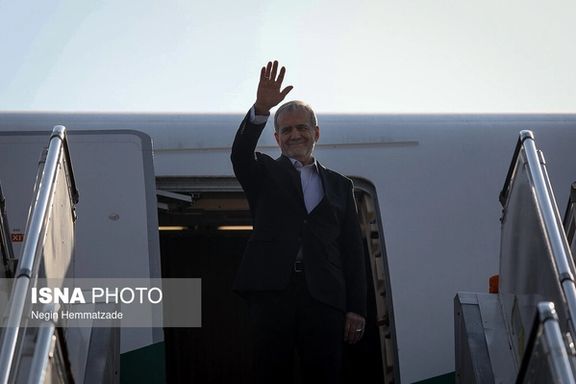
Iranian President Masoud Pezeshkian has arrived in Tajikistan for his first foreign visit of 2025.

Iranian President Masoud Pezeshkian has arrived in Tajikistan for his first foreign visit of 2025.
Announcing the visit, the Foreign Ministry spokesman, Esmail Baghaei, wrote on X, that the visit is a "symbol of the two nations' leaders’ commitment to further strengthening relations."
During the visit, approximately 20 cooperation agreements are expected to be signed between the two countries, according to Iran's Foreign Minister Abbas Araghchi.
Speaking to Iranian media, Araghchi said Tuesday that the agreements will span various sectors, including trade, investment, water and electricity industries, technical engineering services, transportation, tourism, university research, and more.
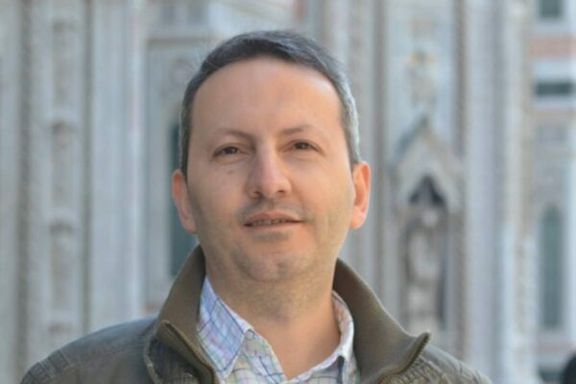
Ahmadreza Jalali, an Iranian-Swedish scientist currently sentenced to death in Iran, accused the Swedish government of neglecting his case in an audio message from Evin Prison.
In the message, which was sent to his wife, Vida Mehrannia, and received by Iran International, Jalali said: "I have been abandoned under these horrific conditions, with the imminent threat of execution looming. It appears that because of my dual nationality, I am regarded as a second-class citizen."
As part of a prisoner exchange agreement in June, Sweden repatriated a former Iranian official convicted of war crimes, Hamid Nouri, in exchange for the release of two Swedish citizens, Johan Floderus, an EU representative, and Saeed Azizi, who had been detained in Iran on charges of "spying for Israel."
However, Jalali, who was sentenced to death in October 2017 on charges of “corruption on earth”, was left behind in Iran.
“Swedish authorities are aware of my situation, yet no actions have been taken to improve it," he added.
"It seems that what might happen to me as a Swedish citizen is not a priority for Swedish officials. I face the risk of death, either by execution or due to my deteriorating health condition."
Since last year's prisoner exchange, Jalali has criticized the decision, describing the Swedish government’s exclusion of him as discriminatory.
In June, he publicly challenged the Swedish Prime Minister to meet with his son and family to explain why he was left behind and what actions would be taken to support them in the event of his execution.
Jalali's trial in Tehran’s Revolutionary Court, Branch 15, was criticized by Amnesty International for relying on confessions obtained under torture.
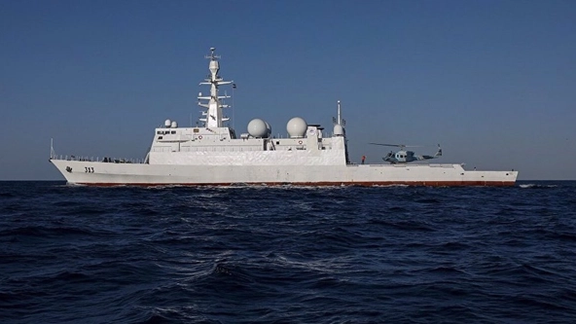
Iran’s navy unveiled its first signals intelligence (SIGINT) vessel, Zagros, on Wednesday, said to be designed for electronic surveillance and cyber intelligence operations.
The announcement follows the news that Iran's army received 1,000 new drones, bolstering its military capabilities.
"The Zagros will serve as the watchful eye of Iran's navy in the depths of the seas and oceans," Navy Commander Shahram Irani said during the unveiling ceremony.
The launch coincides with extensive military exercises aimed at safeguarding the country's nuclear infrastructure, including key facilities in Natanz and Fordow.
The drills, involving both the Islamic Revolutionary Guard Corps (IRGC) and the Iranian army, are expected to continue until mid-March.
The head of the Atomic Energy Organization, Mohammad Eslami, announced on Wednesday that two additional exercises will be conducted in the coming days, focusing on passive defense to demonstrate maximum operational readiness.
The unveiling of the Zagros comes amid intensified and ongoing international scrutiny of Iran's nuclear program.
Tehran maintains its nuclear activities are solely for peaceful purposes, a claim increasingly challenged due to its elevated uranium enrichment levels.
The International Atomic Energy Agency (IAEA) has confirmed that Iran holds uranium enriched to 60%, approaching weapons-grade levels.
Tensions between Iran and the United States have escalated in recent years, especially after the US withdrew from the 2015 nuclear deal during Donald Trump's presidency and reimposed sanctions. Relations were further strained by the killing of General Qassem Soleimani in 2020, as well as Tehran's support for regional proxy groups, and alleged attacks on commercial shipping in the Persian Gulf.
Reports earlier this month suggested that the Biden administration considered potential strikes on Iranian nuclear facilities if Tehran continued its progress toward developing a nuclear weapon.
Iran’s investment in the Zagros and other military technologies underscores its focus on strengthening surveillance and defensive capabilities in response to regional and international challenges.
Admiral Shahram Irani asserted that the ship is domestically constructed and will play a key role in securing maritime domains, including the Indian and Pacific Oceans.
"The Iranian navy has successfully addressed the nation’s defensive demands through local expertise and advanced intelligence capabilities," Admiral Irani said.
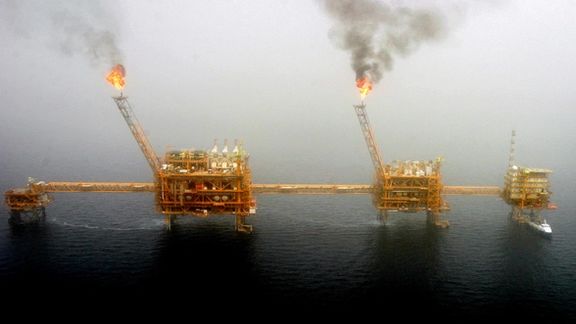
The latest US sanctions targeting Russian and Iranian oil could significantly disrupt Russia's oil supply chains, the International Energy Agency (IEA) said in its monthly report on Wednesday.
The new US sanctions on Iran and Russia announced last Friday, target entities responsible for over one-third of Russian and Iranian crude exports in 2024.
"We maintain our supply forecasts for both countries until the full impact of sanctions becomes more apparent, but the new measures could result in a tightening of crude and product balances," the IEA said.
Washington's latest sanctions package includes over 160 tankers, which the IEA estimates transported about 22% of Russia's seaborne oil exports in 2024.
The agency highlighted the effectiveness of earlier vessel designations, saying they had "reduced the activity of designated tankers by 90%."
The US Treasury on Friday imposed sanctions on several vessels involved in transporting Iranian oil, as part of a broader effort to disrupt Russia's network of ships evading US-led energy sanctions.
Of the 183 blacklisted vessels, eight were identified as having transported both Russian and Iranian oil, the Treasury reported.
"Several of the vessels sanctioned today have shipped not only Russian oil but also sanctioned Iranian oil," the Treasury said.
The vessels are part of a "shadow fleet," described by the Treasury as a network using "high-risk shipping practices" to avoid detection.
Many of these ships have been involved in transporting Russian oil at prices exceeding the $60-per-barrel cap imposed by G7 countries, the Treasury added.
Early January saw crude oil prices rise above $80 a barrel, what the IAE described as a result of tighter sanctions and a cold snap in the northern hemisphere.
However, the IEA anticipates that strong supply growth outside OPEC+ and the potential for OPEC+ to ease production cuts could moderate further price increases.
The IEA forecasts global oil supply growth of 1.8 million barrels per day (bpd) in 2025, with non-OPEC+ production contributing 1.5 million bpd.
While IEA's latest report did not provide an estimate for market surplus in 2025, its December forecast projected at least 950,000 bpd, indicating comfortably supplied market.
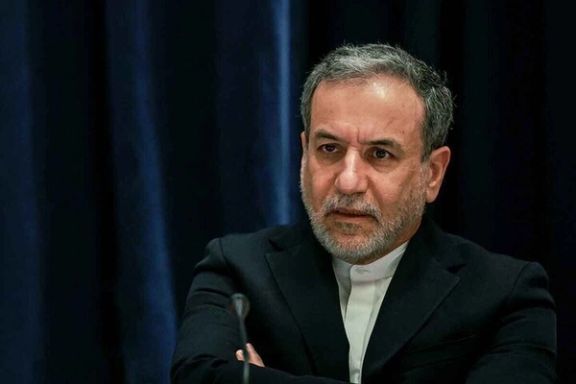
Iran's foreign minister ruled out direct talks with the United States about its disputed nuclear program but emphasized Tehran’s readiness for what he called dignified discussions.
Abbas Araghchi addressed Iran’s stance on nuclear talks in an interview with state TV, saying discussions with Washington are not on the table because it withdrew from an international deal on the issue.
“We are not negotiating with the US government on nuclear issues until they return to the JCPOA or, in any case, announce their policy on this matter,” he said, referring to the 2015 Joint Comprehensive Plan of Action.
"The new US administration has not yet taken office. We will only participate in honorable negotiations based on mutual respect, not under pressure and sanctions, and for our own interests," he added.
"The JCPOA formula remains valid and in place."
Negotiators from Iran and the European E3 countries—France, Britain, and Germany—held a third round of talks on Iran's nuclear program in Geneva on Monday, according to an Iranian deputy foreign minister.
"We discussed ideas involving certain details in the sanctions-lifting and nuclear fields that are needed for a deal," Kazem Gharibabadi said in a post on X. Describing the talks as "serious, frank, and constructive," he noted that both sides agreed to continue their dialogue.
"Sides concurred that negotiations should be resumed and to reach a deal, all parties should create and maintain the appropriate atmosphere," he added.
The JCPOA, signed in 2015, aimed to ensure the peaceful nature of Iran’s nuclear activities in exchange for sanctions relief.
The US withdrawal from the deal in 2018 under the first Trump administration led to renewed sanctions and escalated tensions. Efforts under the Biden administration to revive the deal have been marked by significant challenges, including disputes over sanctions and verification mechanisms.
Araghchi said that in Geneva, Iran will engage with representatives from the EU and three European countries in a bid to revive the nuclear agreement.
“The main goal of the two-day talks in Geneva with representatives from the three European countries and the European Union is to find a way to restart nuclear negotiations and resolve this issue,” Araghchi explained.
He affirmed Iran’s openness to dialogue, provided it adheres to Iran’s terms.
“Regarding the nuclear issue, Iran has never left the negotiation table nor said to oppose negotiations, as it is confident in the peaceful nature of its nuclear program. If there is an honorable and dignified negotiation, we will join it,” he said.
Talks on arms supplies to Russia
Araghchi signaled Iran’s readiness to negotiate with Europe on Ukraine, provided the talks address mutual concerns.
“If Europe complains about Iranian weapons being in Russian hands, it must also answer for its military cooperation in our region and with the Zionist regime. We are ready for dialogue with Europe, but it must be based on mutual concerns,” he added.
Iran has significantly increased its military support to Russia, supplying hundreds of Shahed-136 drones, which have been extensively used in Ukraine to target infrastructure and civilian areas.
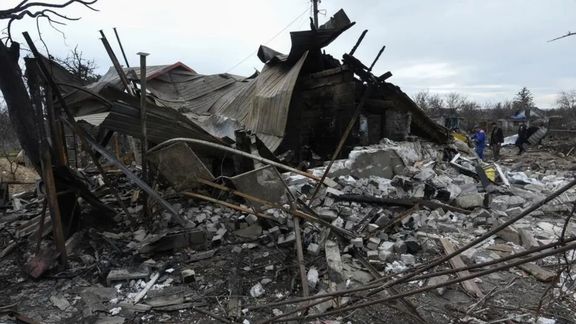
In addition to direct deliveries, Iran has collaborated with Russia to establish a drone manufacturing facility in the Alabuga Special Economic Zone, which became operational in July 2023.
The factory aims to produce thousands of drones annually, bolstering Russia's self-sufficiency in drone production.
Beyond drones, Iran has supplied Russia with short-range ballistic missiles, with satellite imagery revealing shipments of 220 missiles in 2024.
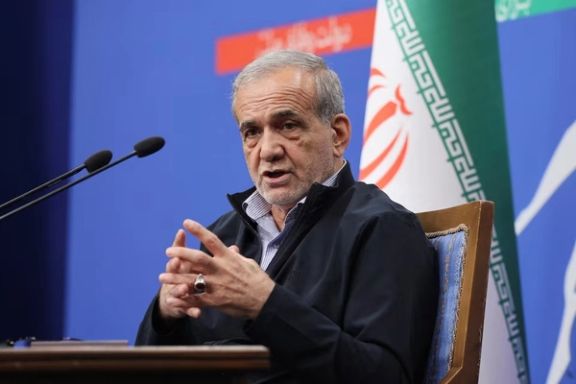
Iran did not plot President-elect Donald Trump's assassination, President Masoud Pezeshkian told NBC, denying allegations by the US Justice Department.
"All the assassinations and acts of terror we see happening in Europe and elsewhere, can we see the footsteps of Iranian nationals or other nationals?" Pezeshkian was quoted as saying in translated remarks in a video preview of the NBC News interview.
"Have there been any links between those terrorist assassinations and Iran? Iran has never been in pursuit of assassination and acts of terror," he added.
Asked by anchor Lester Holt in the interview in Tehran whether Iran had plotted to kill Trump, Pezeshkian replied: "Never by no means."
Holt persisted, asking Pezeshkian if he would promise never to seek to kill Trump.
"Ever since the beginning, we never intended to do that," Pezeshkian said.
The US Justice Department in November unsealed murder-for-hire charges against an Afghan national it said was tasked by Iran’s Islamic Revolutionary Guard Corps with assassinating Trump.
Farhad Shakeri, 51, who is believed to be in Iran, was asked by an IRGC official "to put aside his other efforts on behalf of the IRGC and focus on surveilling, and, ultimately, assassinating (Trump)", the department said.
"Shakeri indicated to IRGC Official-I that this would cost a 'huge' amount of money. In response, IRGC Official-I said that 'we have already spent a lot of money ... [s]o the money's not an issue'."
Iranian officials have repeatedly denied any plot to kill Trump. However, that contradicts several statements by high-ranking officials who have threatened the former US president in the past few years.
Following Khamenei’s proclamation of a “harsh revenge” against the US killing of Soleimani, his official account on X (then Twitter) published an image of Trump on a golf course under the shadow of a drone, hinting at his targeting. That post has since been deleted.
Khamenei’s official website also released an animation with the same theme, showing IRGC forces killing Trump using a robot.
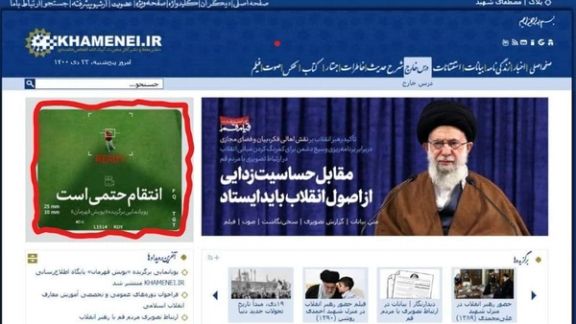
Message of peace
In his interview with NBC News, Pezeshkian added that Tehran is committed to peace and de-escalation, in a dovish message likely aimed at the incoming US administration
"The Islamic Republic of Iran is committed to peace and de-escalation in the region and globally, condemns the Zionist regime's war-mongering, aggression, and genocide, and stands ready for honorable and equal negotiations," Masoud Pezeshkian added.
The Washington-based Abdorrahman Boroumand Foundation for Human Rights in Iran reported last year that the Islamic Republic had kidnapped, disappeared or extrajudicially 452 people beyond Iran's borders in its nearly half-century existence.